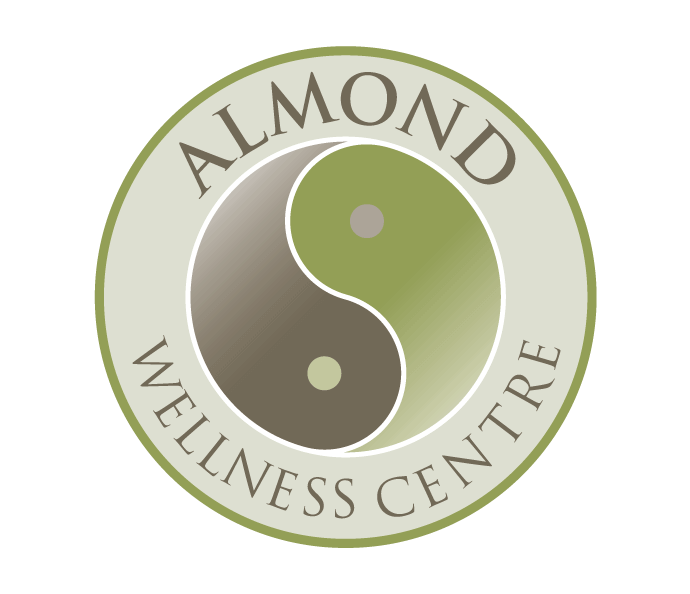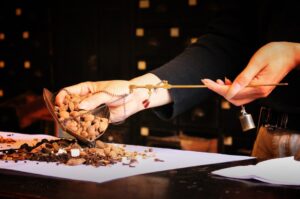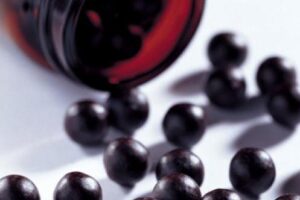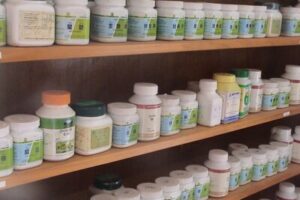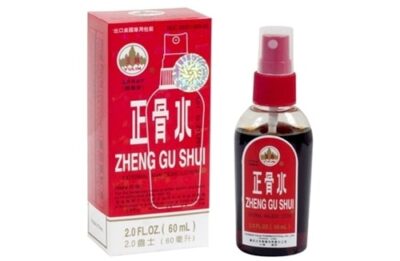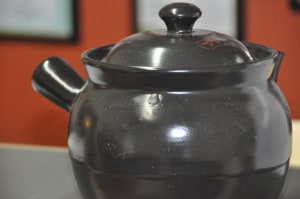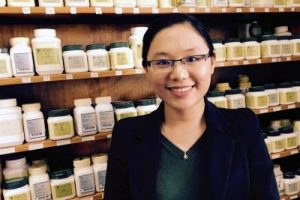Chinese Herbal Medicine Melbourne
Have you heard about Chinese herbal medicine? It’s a natural and drug-free way to get and stay healthy, rooted in thousands of years of Traditional Wisdom.
In places like Almond Wellness Centre Melbourne, Chinese herbal medicine and acupuncture often join forces to tackle various health issues. Let’s dive into the story behind Chinese herbal medicine.
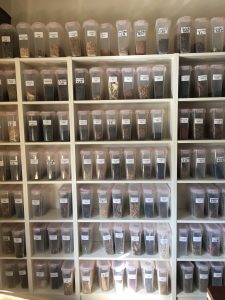
Raw Chinese herbs in Coburg clinic
A Glimpse into History
Chinese herbal medicine has a fascinating history stretching back thousands of years. It’s not just a bunch of plants; it’s a crucial part of Traditional Chinese Medicine (TCM). Over the last 5,000 years, it has transformed into an art form.
Wisdom Passed Down
Imagine ancient herbal knowledge being gathered, tested, and passed down through the generations. Chinese herbal medicine is influenced by concepts like Yin-Yang theory, the Five Elements theory, and the idea of qi (vital energy). It’s all about finding harmony in the body.
Creating Powerful Formulas
Chinese herbalists create special mixtures of herbs based on these ancient principles. They aim to fix imbalances in the body by tonifying deficiencies, dispelling excesses, and achieving overall balance.
Fast Forward to Today
At Almond Wellness Centre Melbourne, Chinese medicine practitioners still prescribe these powerful herbal formulas. Why? Because they work wonders in the healing process. So, if you’re on a quest for wellness, Chinese herbal medicine might just be your ticket to a healthier you.
Benefits of Chinese Herbal Medicine
Curious about the potential perks of Chinese herbal medicine? Here’s a glimpse into what it might offer:
Holistic Healing
Chinese herbal medicine embraces a holistic perspective. It doesn’t just tackle symptoms; it delves into the root causes of health issues.
Personalised Care
Tailored to you: Chinese herbal remedies consider your unique constitution, disharmony patterns, and health conditions. This personalised touch can make treatments more precise and effective.
Nature’s Ingredients
Packed with natural goodness: Chinese herbal medicine relies on plant-based ingredients, offering a natural alternative to pharmaceutical drugs.
Teamwork Formulas
It’s all about collaboration: Chinese herbalists craft formulas with multiple herbs working together. This teamwork enhances effects and minimises potential side effects.
Tackling the Tough Stuff
For the long game: Chinese herbal medicine shines in managing chronic conditions like allergies, digestive issues, insomnia, and stress-related problems.
Boosting Overall Well-being
Not just healing – strengthening too! Chinese herbal medicine aims to fortify your body, improve organ function, and amp up the immune system.
The goal? Preventing future illnesses and ensuring long-term well-being.
Side Effect Safeguard
When in expert hands, it’s safe!
Chinese herbal medicine, under a trained herbalist’s guidance, usually comes with minimal side effects. Careful formulations and dosage keep risks low.
Mix and Match
Herbs are Team players – Chinese herbal medicine plays well with others – think acupuncture, dietary tweaks, and lifestyle changes. This combined approach ensures comprehensive care for patients.
Remember, while many sing praises of Chinese herbal medicine, not all benefits are scientifically proven. And, as with anything, individual experiences may vary.
Chinese Herbal Formulas: A Harmony of Roles
Ever wondered about the secret recipe behind Chinese herbal formulas? Well, it’s a symphony of herbs, each playing a distinct role. Here’s a breakdown:
Chief herbs (君 Jun)
Meet the stars of the show.
Chief herbs take centre stage, addressing the primary issue. They’re the powerhouse, setting the therapeutic tone for the entire formula.
Deputy herbs (臣 Chen)
Supporting actors.
Deputy herbs have the Chief’s back, dealing with secondary signs and symptoms. Teamwork is crucial in herbal formulations.
Assistant herbs (佐 Zuo)
The backstage crew.
Assistant herbs play a vital role in supporting and enhancing the effects of the other herbs. They also step in to mellow out any potential harshness.
Envoy herbs (使 Shi)
The diplomats.
Envoy herbs bring it all together, harmonising, guiding, and directing the formula’s action. They ensure that the herbal effort is focused on specific meridians or areas of the body.
This classification system is like a well-choreographed dance, ensuring that each herb contributes its unique strength to create a harmonious and effective blend. So, next time you delve into a Chinese herbal formula, remember – it’s all about balance and collaboration!
Herbs Used at Melbourne Chinese Medicine Clinics
At Almond Wellness Centre in Melbourne, we embrace the ancient wisdom of Chinese herbal medicine to provide a natural path to well-being. Our herbal offerings come in various forms, each tailored to your individual needs:
Raw herbs
Authentic raw Chinese herbs prepared as a tea.
Herbal pills
Easy-to-take herbal pills for seamless integration into your routine.
Herbal granules
Potent herbal goodness in granule form for a quick and convenient remedy.
Liniment or cream
Topical application for targeted relief and support.
Chinese Herbal Medicine Melbourne: A Holistic Approach
At Almond Wellness Centre, our experienced Chinese herbalists stationed at both our Ringwood clinic and Coburg clinic, follow a holistic approach in prescribing these herbal remedies. Here’s a glimpse into the process:
Diagnosis and Assessment
- Method: Thorough evaluation of physical symptoms, emotional well-being, medical history, and lifestyle factors.
- Goal: Identify patterns of disharmony based on TCM concepts like Yin-Yang imbalances and the flow of qi.
Pattern Identification
- Outcome: Pinpoint specific disharmony patterns causing symptoms (Pattern Diagnosis).
- Common Patterns include: Deficiencies, excesses, heat, cold, dampness, and stagnation.
Herb Selection
- Criteria: Choose herbs based on their specific properties, tastes, and effects.
- Categories: Herbs classified as warming, cooling, drying, or moistening.
Formulation Creation
- Approach: Craft complex formulations with multiple herbs to address various aspects of disharmony.
- Objective: Balance and enhance each herb’s effects, minimising potential side effects.
Customisation
- Focus: Tailor formulations to fit the unique constitution and needs of each patient.
- Result: Ensure treatment is well-suited to the individual’s condition.
Dosage and Administration
- Determination: Set appropriate dosage and administration methods.
- Options: Decoctions, powders, pills, or capsules based on patient’s condition and specific herbs used.
Monitoring and Adjustments
Dynamic Treatment: Regularly monitor progress and adjust formulations based on changing symptoms and patterns.
Chinese herbalists often combine multiple herbs in a single formula. These combinations are designed to work synergistically, enhancing each other’s effects while minimising potential side effects.
Integrated Healing
Integrates seamlessly with other treatments like acupuncture, dietary changes, and lifestyle modifications.
Please note that while many people have reported positive experiences with Chinese herbal medicine, not all benefits have been scientifically validated, and individual responses can vary.
Are Chinese Herbal Medicine Safe?
Absolutely, when in the hands of our qualified and experienced herbalists. Your journey to well-being begins here.
Meet Our Expert Chinese Herbalists in Melbourne
Dr. Richard Zeng
- Credentials: Revered acupuncturist and Chinese herbalist with over 25 years of experience.
- Expertise: Blends Western and Traditional Chinese Medicine.
- Specially interested in: Fertility, women’s health, cancer support, and diverse health conditions.
- Heritage: Comes from a family legacy of generations of healers.
- Practice Locations: Coburg clinic and Ringwood clinic.
Dr. Ruby Hou
- Credentials: Compassionate Chinese herbalist and acupuncturist with B.Med and M.Med degrees.
- Clinical Training: Extensive experience in both China and Australia.
- Specially interested in: Fertility, women’s health, IVF support, and holistic care.
- Language Skills: Fluent in English, Mandarin, Cantonese, and Hakka.
- Practice Locations: Coburg clinic and Ringwood clinic.
Dr. Tracey Byrne
- Credentials: Holds dual degrees from RMIT in BAppSc (Chinese Medicine) and BAppSc (Human Biology).
- Expertise: Pain management, women’s health, paediatrics, and cancer support.
- Approach: Integrates acupuncture, herbal medicine, and remedial massage therapy.
- Practice Location: Coburg clinic.
Dr. Mira An
- Expertise: Skilled in holistic nutrition and Chinese herbal medicine.
- Specially interested in: Women’s health, fertility, skin rejuvenation, and dermatology.
- Approach: Emphasises TCM’s holistic approach with personalised acupuncture, Chinese herbal medicine, and nutrition.
- Practice Location: Ringwood clinic.
So, the art of creating a Chinese herbal formula? It is to
